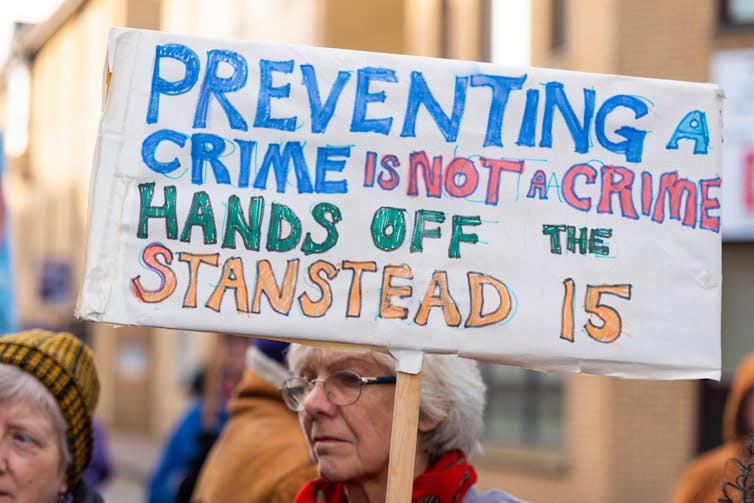
To widespread delight, Ian Burnet, lord chief justice, handed down judgement in the Court of Appeal, quashing the convictions of direct action protesters known as the Stansted 15.
Following the release from prison of three anti-fracking activists in October 2018, this is the second major victory in the court for non-violent direct action protesters in recent years. But the terms of this victory should be considered carefully: it has two stings in the tail.
In March 2017, the 15 protesters cut through the perimeter fence of Stansted airport, “locked on” to one another around the nose wheel of a Home Office chartered deportation flight to west Africa, and built a tripod behind the wing to stop it moving.
They were prosecuted under a very specific and rarely used charge, s1(2)(b) of the Aviation and Maritime Security Act (AMSA) 1990. This legislation was enacted in the wake of the Lockerbie bombing in order to make UK law consistent with an international agreement dealing with acts of terrorism at airports. The defence had argued that the AMSA couldn’t therefore be applied to non-terrorist actions like the Stansted 15’s. However, this argument was rejected in the original trial by the judge, Christopher Morgan.
Quashing the convictions, the Court of Appeal accepted the appellants’ case that this charge should never have been brought in a case of non-violent direct action. There was, in the words of the court, “no case to answer”.
What the victory means for protesting
This is an important outcome not just for protest rights (and for common sense), but for democratic and legal process. Misuse of legislation by the Crown could infringe the right to protest and deter others from protesting in future. But while it is important that AMSA is now unlikely ever to be brought again against non-violent activists, in reality, this is only a limited victory for protest rights; after all, AMSA had never been used against activists before.
More important is what the court’s ruling says about protest rights in general.
In the initial trial, while the prosecution argued that the defendants’ actions at Stansted were “political”, the defendants insisted they acted out of necessity, to prevent a greater harm. This is a relatively common defence from activists prosecuted for direct action, such as climate disobedience.

Avpics/Alamy Stock Photo
Unlike in some climate change trials, however, the danger the defendants cited was direct, material, and identifiable: they had to stop the flight because they had information that three of the people scheduled to be on it faced imminent and serious harm after deportation. Judge Morgan ruled however that this necessity defence did not meet the standard to be put to the jury.
The Court of Appeal agreed, classing the defendants’ actions as primarily political. The Court stated that in the UK, the correct forum for complaints about deportations is immigration tribunals. As a consequence, there could be no justification for using direct action to prevent deportations.
Of the 60 people due to be deported on the flight in question, 11 are still in the UK and five have now established their right to remain. It’s hard to square this with the court’s insistence that the Home Office, and the “deport first, appeal later” hostile environment, is either functional or democratic.
The fact that the Court of Appeal supported the judge in ruling against a necessity defence is important for future trials of protesters. The Stansted 15’s action required commitment, know-how, and organisational networks; it is therefore inherently political. Some of the defendants also had clear political motives. But this does not mean it can’t also be an urgent humanitarian intervention carried out to save people from harm.
Rather than a victory, we expect this ruling will encourage the lower courts to consider direct action as something that is only driven by political motives, regardless of context. Defences, too, will find it even harder to persuade judges to put “the necessity defence” to juries. Perhaps the only avenue for a successful defence in protest trials now is for a perverse verdict, where a jury (or bench of magistrates) acquits despite the law.
Political prosecution
The Stansted prosecution was itself political. The attorney general must give consent for any prosecution under AMSA. In the original trial, the defence argued this consent had been wrongly given, and that prosecution was an abuse of process.
Implicitly, the Court of Appeal appears to agree. Yet this ground of appeal was summarily dismissed by Burnett in just one paragraph, rejecting all “basis for impugning the decision” of the AG. Despite the inappropriateness of the charge on multiple counts, there were no grounds to question the AG’s involvement. For the court, this was simply an honest mistake, of the kind that happens in all walks of life.
As we discuss in our article on the original Crown Court trial, we tend to think too much about the outcomes of trials and not enough about the processes that defendants are subjected to. In this case, 15 defendants were put through a gruelling and exceptionally stressful process for an offence which is normally charged – and in this case, was initially charged – as aggravated trespass.
In cases like this, the AG’s consent is specifically required because it is designed to safeguard against the over-reach of the Crown, not enable it.
On both these counts, it is hard to see anything other than a closing of ranks in the Court of Appeal’s decision: a further restriction of protest defences (because they are inherently political), while giving a tacit endorsement of political involvement in charging.
It’s important to celebrate when clear miscarriages of justice are overturned. But the wider implications of this ruling are much less encouraging for the exercise of non-violent direct action. The home secretary is reportedly currently working on bringing new legislation to further curb protest rights; there will doubtless be more trials and more appeals like this.
![]()
The authors do not work for, consult, own shares in or receive funding from any company or organisation that would benefit from this article, and have disclosed no relevant affiliations beyond their academic appointment.

